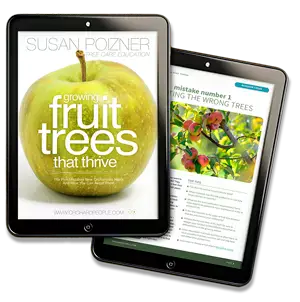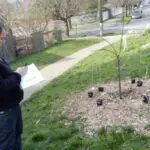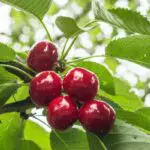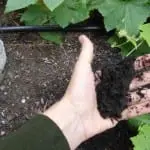Make your fruit trees more fruitful! Learn how to weigh down fruit tree branches using limb spreaders and tree weights.
Fertilizer Focus: Is Chicken Manure Good For Fruit Trees

Is Chicken Manure Good for Fruit Trees?
Growing delicious fruit is hard work and each spring, after emerging from dormancy, your hungry fruit trees will need a nutrient-rich boost to help fuel leaf growth, and blossom and fruit formation. But when it comes to fertilizer, is chicken manure the right choice?
In this blog we’ll explore the pros and cons of chicken poop and when it might be beneficial to use when mulching your fruit trees.
When Chicken Manure is Bad For Plants
Chicken manure has been used to feed plants for centuries but part of what makes this fertilizer so powerful is also what makes it potentially damaging to plants. Fresh chicken manure is a wet, stinky combination of both poop and liquid that's high in ammonia.
It's the ammonia that can break down into nitrogen – and makes chicken manure so smelly. All plants need nitrogen as a growth booster. Too much nitrogen in fruit trees spurs the vigorous growth of branches at the expense of flowers. And with no flowers, there’s no delicious fruit.
So when it comes to fertilizing fruit trees, using raw and un-composted chicken manure is not a good idea.
When Chicken Manure is Good for Plants
The next option is perhaps using composted chicken manure which you can purchase from your local garden centre in bags, or get from a local farm.
If you’re composting your own chicken manure, you want to be sure that the fresh poop is composted with a generous amount of carbon-rich straw or other bedding. As with any composting you need a combination of carbon and nitrogen to create the perfect environment for soil microbes to get to work.
As the chicken manure sits for a while, the microbes in the soil break it down into nutrients our fruit trees can absorb and use. While this magical composting process happens, some of the excess nitrogen evaporates as ammonia gas. The compost needs to be turned several times and experts suggest the mixture age for at least six months before applying to fruit trees and plants.
After composting, the chicken manure will have small amounts of the three key nutrients all plants need including nitrogen (N), phosphorus (P) and potassium (K).
Fruit Trees
That Thrive

Chicken manure packs a bigger punch than composted manure from other animals. Here’s why: sheep, cow and other composted manure are about 1% N, 1% P and 1% K by weight. Chicken manure, on the other hand, can reach 5% N, 3% P and 2% K by weight.
As another bonus, manure from egg laying hens contains more calcium by weight thanks to the eggshell production process. Calcium strengthens the cells in fruit, shoots and roots for healthier and more tasty and juicy fruit.
So for a natural product, it seems you have a lot to gain and little to lose when spreading a small amount of composted chicken manure over the roots of your fruit trees.

Dried Chicken Manure

Composted properly and used in moderation, chicken manure can be great for your fruit trees. But there is another option that’s been developed by an innovative Quebec-based company called Acti-Sol.
Acti-Sol produces dried hen manure fertilizers. Their fertilizers don’t smell because the manure is dried before it can form ammonia. Orchard People is proud to have this company as a sponsor for our information packed fruit tree care podcast “The Urban Forestry Radio Show”.
The Quebec-based company uses a unique dryer system – right at the henhouse—to quickly dehydrate fresh hen droppings. This stops smelly ammonia from forming, and leaves behind a high quality, natural fertilizer that won’t harm your plants.
Acti-Sol’s products are approved for organic agriculture. They only use manure from egg-laying hens that are not treated with hormones or antibiotics. As a result, farmers, as well as health conscious home gardeners, can sprinkle Acti-Sol hen manure on their organic crops.
So How Much Chicken Manure Should You Use on Your Trees
If you are using composted chicken manure, start with spreading just one inch of the fertilizer around the roots of your tree in the early spring and see how it affects your trees growth and production.
If you are using Acti-Sol, you may want to choose the formulation specifically for fruit trees that`s 4% nitrogen, 6% phosphorus and 8% potassium by weight (look for 4-6-8 and photos of fruit trees on the package). Acti-Sol added bone meal and natural potash to its multipurpose hen manure to meet the needs of hard working fruit trees. The extra boost of phosphorus and potassium helps with flower bud and fruit formation
Learn more about feeding your fruit trees
If you want to learn more about feeding your fruit trees and amending your soil, sign up for OrchardPeople.com's Certificate In Beginner Fruit Tree Care at www.orchardpeople.com/workshops. It's an award-winning home-study course that you can take anytime, using your computer or mobile device. In the 8-hour course you’ll learn how to prune your fruit trees, feed them and protect them from pests and disease. And for more free content, subscribe to OrchardPeople.com's monthly newsletter or listen to our fruit tree care podcast at www.orchardpeople.com.

Andrea Bannister is a freelance communicator and lifelong gardener based in Toronto, Canada



